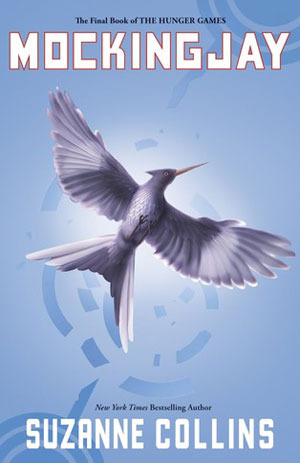Mockingjay had some serious living up to do. After The Hunger Games, and Catching Fire, the issue for Suzanne Collins was how to reel readers in for a third time. The possibility of another Hunger Games taking place seemed implausible, and so we are taken on a street level tour of District 13 in this book.
The rebellion appears to be in full swing, but the Capitol have a weapon in the form of Peeta. They use him in the same way that Katniss, for a large part of this book, seems to be used.
Christopher Nolan, director of the Dark Knight trilogy, at first did not want to do a third film in the series. That film, which became The Dark Knight Rises, would have almost certainly featured Heath Ledger's Joker. Given the actor's death, revisions to the script had to be made.
The general consensus is that 'Rises' is the weakest of the three movies. But I see the series as one whole, and if you look at it in those terms, it's very enjoyable indeed. You have a clear beginning, middle, and end.
Mockingjay has this too, and the ending to Catching Fire just made your pulse race harder than anything that was in the first book. Yes, it was that good, in my view. Surely after that, the only way is down? Christopher Nolan didn't want to do the third Batman film because 'how often does the third story beat out the previous ones?'
And he is right. It's so difficult to get the third story in the series right. Mockingjay also seems to have
polarised many readers, but most seem to think this is a fitting end to the series. Here's my take on it, given I read the book nearly two years ago now, and with the new film coming out, I just had to reacquaint myself with the story.
I had previously rated Mockingjay 4 stars out of 5 on GoodReads. Would this rating stand up?
I recall that my experience mirrored many others. Book 1, read as fast as I could (in my case, 1.5 days - I even wanted to reschedule teaching lessons in order to finish the book!), Catching Fire, best part of a week, Mockingjay....nearly three months.
Was I 'Gamed out' by this point? Had I tired of Panem's situation? No, it wasn't that. The pace of Book 1 and 2 was frenetic, to put it mildly. Book 3, in contrast, was slow, plodding, and yes...a bit depressing. I wanted to know where the spirited Katniss had gone.
She became one of my favourite heroines in book form, but Jennifer Lawrence's portrayal on the big screen elevated Katniss to something else. That's why I think the film will still be good. Is it really Suzanne Collin's fault that some readers feel let down by the pace of this final book? Most say 'I was expecting something mind blowing'? And of course, that is fair enough.
Another comment was that the publisher pushed Miss Collins to write this third book, one she never intended to write. The whole evolution of Katniss from plucky fighter who replaced her sister in the 74th Games to this inward looking girl, who cannot seem to choose between Peeta and Gale, really irked me.
I know she is young, and she has seen many horrors, but Peeta, though kind to her, was more of the Games's invention - they were star crossed lovers because that's what kept them alive. I never really bought the relationship, and I felt - always - that Gale was closer to her.
In the latter part of Mockingjay, Katniss still seems very confused, and it's not something I was comfortable with. Maybe it is how the author saw the character growing, but I felt it was a step back. I wanted Katniss not necessarily to be the symbol of the rebellion...after all, anyone could be the Mockingjay, really - it was more that I wanted her to have a happy ending, and I am not sure Suzanne Collins gave us that.
Many of you will have read the series, but on speaking to many people I know, not so many have, so I'll leave the spoilers out.
Ultimately Mockingjay is a case of some missed chances. There's dramatic points parachuted in needlessly, whereas in the first two books, the drama was truly engrossing. These points were introduced in order to make the reader feel some emotion, but I felt a huge disconnect here.
There is one genuine shock I did not see coming, and for those who will just watch the movie, it will be a real high point of the series.
Catching Fire - the movie, was almost certainly better than the first film. Somehow, I don't think Mockingjay will pull it off. But it will be an enjoyable ride nonetheless.
My rating holds for now.



